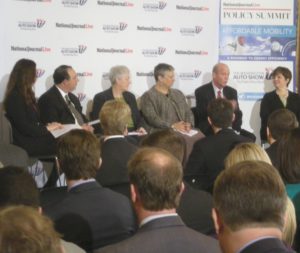by Joanne Ivancic (Advanced Biofuels USA) “Affordable Mobility: A Roadmap to Energy Efficiency” framed a public discussion of automotive issues for Capitol Hill staff which ranged from fuel efficiency and the new CAFÉ (Corporate Average Fuel Economy) standards to increasing gas taxes (highway user fees) at state and local levels; from vehicle costs related to safety mandates and other regulations to infrastructure needs to achieve greater efficiency and lower emissions.
 From left, Fawn Johnson, Mitch Bainwol, Gina McCarthy, Mary Nichols, Don Chalmers and Rebecca Lindland discuss "The Costs, Benefits and Future of Affordable Mobility."
From left, Fawn Johnson, Mitch Bainwol, Gina McCarthy, Mary Nichols, Don Chalmers and Rebecca Lindland discuss "The Costs, Benefits and Future of Affordable Mobility."
National Journal correspondent, Fawn Johnson, moderated a panel discussion featuring Mitch Bainwol, president and CEO of the Alliance of Automobile Manufacturers, Don Chalmers of the National Auto Dealers Association, Rebecca Lindland, director of research for IHS Automotive, Gina McCarthy, assistant administrator for EPA’s Office of Air and Radiation, and Mary Nichols, chairman of the California Air Resources Board.
National Journal’s Amy Harder then interviewed Robert Bienenfeld, senior manager, environment & energy strategy for American Honda Motor Co., Reg Modlin, director of regulatory affairs for Chrysler, LLC, and Tom Stricker, vice president of technical and regulatory affairs, and energy and environmental research for Toyota Motor North America, Inc. in a ‘Report from the Automakers’ panel.
Bainwol articulated a key dilemma explaining that the automotive industry doesn’t really like mandates and regulations; but they do want certainty; and while they will push to achieve the ideal, they also look to the customers’ reality. This requires a “capacity to be nimble.”
 From left, Amy Harder, Tom Stricker, Rbert Bienenfeld and Reg Modlin report on energy security benefits, consumer safety and environmental advancements for cars of the future.
From left, Amy Harder, Tom Stricker, Rbert Bienenfeld and Reg Modlin report on energy security benefits, consumer safety and environmental advancements for cars of the future.
This was a diplomatic way to indicate that although the Obama administration’s ideal might be to transition to a fleet of electric vehicles, the reality is, as Modlin later explained, the market for EVs has plateaued at 3%. Thus, even though the number of plug-in or hybrid electrics models reached about 60, the competition is not for an expanded market, but for one that has stagnated.
Similarly, Modlin continued, regarding other alternative vehicles, not only consumer acceptance, but availability of fuels will determine what the future looks like.
In general, Lindland of HIS Global Insight explained that cultural changes including more car sharing lead forecasters to believe that fewer vehicles will be sold in the US, period, leaving auto manufacturers competing for pieces of a smaller pie.
To win a piece of that pie, affordability is key. Honda’s Bienenfeld anticipates lots of evolutionary changes to the internal combustion (gasoline-powered) engines with reduced power consumption, improved aerodynamics and more. He spoke of “redefining” what is conventional oil. He proposed a process that proved successful in achieving clean air goals set 40 years ago. He urged that technology-neutral, performance-based policy goals be set with industry tasked with achieving those goals as they see fit according to their expertise not only in technology development, but also in developing customer acceptance.
Stricker spoke of “improved fuels” that would contribute to achievement of the efficiency and pollution control/carbon emissions minimization goals.
EPA’s McCarthy also noted how successful a collaborative approach to developing goals could be, with 2016 standards already reached in significant ways. She also indicated support for policy goals not based on ideals, but on sound understanding of technologies in the marketplace now and those that will be in the marketplace in 2025, with a recognition that internal combustion and diesel engines will predominate through that period, with EV’s expected to stay at 2% of the market and with hybrids reaching 5%. Others in the industry affirmed her forecast, also hinting that there might be technologies used in hybrids applied to other parts of the fleet, as well.
 Advanced Biofuels USA board member and Atlantic Biomass Conversions president Bob Kozak asks about Tier 3 regulatory changes related to octane in the ornate Cannon Building Caucus Room.
Advanced Biofuels USA board member and Atlantic Biomass Conversions president Bob Kozak asks about Tier 3 regulatory changes related to octane in the ornate Cannon Building Caucus Room.
Talk of taxes (highway user fees) on gas and other vehicle power sources as a way to provide needed funds for transportation infrastructure was all over the place, seemingly in an attempt to avoid providing the kind of straight answer to the question provided by California Air Resource Board chairman Nichols, that it would be impossible to raise gas taxes.
Nichols did brag a bit about California’s progress in looking toward “fuels of the future” as giving the greatest bang for the buck environmentally. Although it was hard to get anyone to say the word, “biofuels,” a later mention of cellulosic ethanol indicates they were surely on her mind, and she did admit that much electricity in California comes from coal-fired plants.
Discussion of Tier 3 regulations focused on low sulfur regulations due in March. When asked if that announcement will also include anything on new certification fuels to replace the current E0 certification fuel, a cert fuel that might address California’s efforts to create a cert fuel more representative of the E10 that is commercially available, or a high octane fuel that may be recommended to achieve new CAFÉ standards, McCarthy would only suggest checking the proposed regulations when they are published.
Related to the topic of biofuels, Bienenfeld gave an indication of how the car manufacturers may be looking at them by illustrating his thoughts with the following calculations. Achievement of the new CAFÉ standards at twice the average mpg we have now, means half the cost per mile; thus a person would experience the same “wallet feel” with gas at $6.00/gallon. This does two things. It could signal to the market an opportunity to increase the price of gasoline. He noted that this could accommodate an increase in the gas tax; those who understand that the price of advanced biofuels might be higher before it gets lower might also see an opening that would accommodate a market for those improved fuels. As Bienenfeld noted, if a carbon tax is assessed along the value chain prior to the retail pump, the result of increased mpg will be to accommodate the passing of that carbon tax to the consumer at the pump.
He summarized the key overarching questions: What does society value? And how to implement those values so that the result is fair and balanced?
He surmised that this provides a good opportunity to transition to ethanol, cellulosic ethanol, biobutanol and other renewable fuel components in a way that is transparent to the consumer; just as we transitioned from leaded to unleaded fuels. Thus, he suggested that drop-in biofuels would be the way to go.
Chrysler’s Modlin emphasized that “we can’t just keep on using fossil fuels,” that we can use different feedstocks to make new, sustainable fuels while creating jobs in every state. He sees a strong role for that, mentioning technologies for the development of cellulosic biofuels. He warned that prescribing a specific octane fuel would be as dangerous as prescribing a carbon tax; however, the auto manufactuers would like a narrowly specified fuel.
Toyota’s Stricker added that the fuel that cars are designed to use has to be available to consumers. If not, then they will demand waivers and will end up operating their vehicles on sub-optimal fuel. And that will thwart achievement of the efficiency and carbon emissions reduction policy goals. Success will depend not only on automotive technological advances, but also on appropriate infrastructure materializing.
After a discussion of other alternative fuels from natural gas as CNG and LNG, hydrogen for fuel cells, etc., Bienenfeld summed up with a reminder that 40 years ago cars had half the fuel economy and 1000 times the pollution of vehicles today. In many ways that transition was invisible to the consumer, yet what today’s consumers have in common with those of 40 years ago is an expectation of innovation that will successfully address goals of even greater efficiencies and improved pollution and carbon emission controls. READ MORE WATCH C-Span Coverage ( 42:39 - 45:36 for discussion of new certification fuel, ethanol blends, etc.)
photos by J. Ivancic
Nearly 55,000 articles in our online library!
Use the categories and tags listed below to access the nearly 50,000 articles indexed on this website.
Advanced Biofuels USA Policy Statements and Handouts!
- For Kids: Carbon Cycle Puzzle Page
- Why Ethanol? Why E85?
- Just A Minute 3-5 Minute Educational Videos
- 30/30 Online Presentations
- “Disappearing” Carbon Tax for Non-Renewable Fuels
- What’s the Difference between Biodiesel and Renewable (Green) Diesel? 2020 revision
- How to De-Fossilize Your Fleet: Suggestions for Fleet Managers Working on Sustainability Programs
- New Engine Technologies Could Produce Similar Mileage for All Ethanol Fuel Mixtures
- Action Plan for a Sustainable Advanced Biofuel Economy
- The Interaction of the Clean Air Act, California’s CAA Waiver, Corporate Average Fuel Economy Standards, Renewable Fuel Standards and California’s Low Carbon Fuel Standard
- Latest Data on Fuel Mileage and GHG Benefits of E30
- What Can I Do?
Donate
DonateARCHIVES
- February 2026
- January 2026
- December 2025
- November 2025
- October 2025
- September 2025
- August 2025
- July 2025
- June 2025
- May 2025
- April 2025
- March 2025
- February 2025
- January 2025
- December 2024
- November 2024
- October 2024
- September 2024
- August 2024
- July 2024
- June 2024
- May 2024
- April 2024
- March 2024
- February 2024
- January 2024
- December 2023
- November 2023
- October 2023
- September 2023
- August 2023
- July 2023
- June 2023
- May 2023
- April 2023
- March 2023
- February 2023
- January 2023
- December 2022
- November 2022
- October 2022
- September 2022
- August 2022
- July 2022
- June 2022
- May 2022
- April 2022
- March 2022
- February 2022
- January 2022
- December 2021
- November 2021
- October 2021
- September 2021
- August 2021
- July 2021
- June 2021
- May 2021
- April 2021
- March 2021
- February 2021
- January 2021
- December 2020
- November 2020
- October 2020
- September 2020
- August 2020
- July 2020
- June 2020
- May 2020
- April 2020
- March 2020
- February 2020
- January 2020
- December 2019
- November 2019
- October 2019
- September 2019
- August 2019
- July 2019
- June 2019
- May 2019
- April 2019
- March 2019
- February 2019
- January 2019
- December 2018
- November 2018
- October 2018
- September 2018
- August 2018
- July 2018
- June 2018
- May 2018
- April 2018
- March 2018
- February 2018
- January 2018
- December 2017
- November 2017
- October 2017
- September 2017
- August 2017
- July 2017
- June 2017
- May 2017
- April 2017
- March 2017
- February 2017
- January 2017
- December 2016
- November 2016
- October 2016
- September 2016
- August 2016
- July 2016
- June 2016
- May 2016
- April 2016
- March 2016
- February 2016
- January 2016
- December 2015
- November 2015
- October 2015
- September 2015
- August 2015
- July 2015
- June 2015
- May 2015
- April 2015
- March 2015
- February 2015
- January 2015
- December 2014
- November 2014
- October 2014
- September 2014
- August 2014
- July 2014
- June 2014
- May 2014
- April 2014
- March 2014
- February 2014
- January 2014
- December 2013
- November 2013
- October 2013
- September 2013
- August 2013
- July 2013
- June 2013
- May 2013
- April 2013
- March 2013
- February 2013
- January 2013
- December 2012
- November 2012
- October 2012
- September 2012
- August 2012
- July 2012
- June 2012
- May 2012
- April 2012
- March 2012
- February 2012
- January 2012
- December 2011
- November 2011
- October 2011
- September 2011
- August 2011
- July 2011
- June 2011
- May 2011
- April 2011
- March 2011
- February 2011
- January 2011
- December 2010
- November 2010
- October 2010
- September 2010
- August 2010
- July 2010
- June 2010
- May 2010
- April 2010
- March 2010
- February 2010
- January 2010
- December 2009
- November 2009
- October 2009
- September 2009
- August 2009
- July 2009
- June 2009
- May 2009
- April 2009
- March 2009
- February 2009
- January 2009
- December 2008
- November 2008
- October 2008
- September 2008
- August 2008
- July 2008
- June 2008
- May 2008
- April 2008
- March 2008
- February 2008
- January 2008
- December 2007
- November 2007
- October 2007
- September 2007
- August 2007
- June 2007
- February 2007
- January 2007
- October 2006
- April 2006
- January 2006
- April 2005
- December 2004
- November 2004
- December 1987
CATEGORIES
- About Us
- Advanced Biofuels Call to Action
- Aviation Fuel/Sustainable Aviation Fuel (SAF)
- BioChemicals/Renewable Chemicals
- BioRefineries/Renewable Fuel Production
- Business News/Analysis
- Cooking Fuel
- Education
- 30/30 Online Presentations
- Competitions, Contests
- Earth Day 2021
- Earth Day 2022
- Earth Day 2023
- Earth Day 2024
- Earth Day 2025
- Executive Training
- Featured Study Programs
- Instagram TikTok Short Videos
- Internships
- Just a Minute
- K-12 Activities
- Mechanics training
- Online Courses
- Podcasts
- Scholarships/Fellowships
- Teacher Resources
- Technical Training
- Technician Training
- University/College Programs
- Events
- Coming Events
- Completed Events
- More Coming Events
- Requests for Speakers, Presentations, Posters
- Requests for Speakers, Presentations, Posters Completed
- Webinars/Online
- Webinars/Online Completed; often available on-demand
- Federal Agency/Executive Branch
- Agency for International Development (USAID)
- Agriculture (USDA)
- Commerce Department
- Commodity Futures Trading Commission
- Congressional Budget Office
- Defense (DOD)
- Air Force
- Army
- DARPA (Defense Advance Research Projects Agency)
- Defense Logistics Agency
- Marines
- Navy
- Education Department
- Energy (DOE)
- Environmental Protection Agency
- Federal Energy Regulatory Commission (FERC)
- Federal Reserve System
- Federal Trade Commission
- Food and Drug Administration
- General Services Administration
- Government Accountability Office (GAO)
- Health and Human Services (HHS)
- Homeland Security
- Housing and Urban Development (HUD)
- Interior Department
- International Trade Commission
- Joint Office of Energy and Transportation
- Justice (DOJ)
- Labor Department
- National Academies of Sciences Engineering Medicine
- National Aeronautics and Space Administration
- National Oceanic and Atmospheric Administration
- National Research Council
- National Science Foundation
- National Transportation Safety Board (NTSB)
- Occupational Safety and Health Administration
- Overseas Private Investment Corporation
- Patent and Trademark Office
- Securities and Exchange Commission
- State Department
- Surface Transportation Board
- Transportation (DOT)
- Federal Aviation Administration
- National Highway Traffic Safety Administration (NHTSA)
- Pipeline and Hazardous Materials Safety Admin (PHMSA)
- Treasury Department
- U.S. Trade Representative (USTR)
- White House
- Federal Legislation
- Federal Litigation
- Federal Regulation
- Feedstocks
- Agriculture/Food Processing Residues nonfield crop
- Alcohol/Ethanol/Isobutanol
- Algae/Other Aquatic Organisms/Seaweed
- Atmosphere
- Carbon Dioxide (CO2)
- Field/Orchard/Plantation Crops/Residues
- Forestry/Wood/Residues/Waste
- hydrogen
- Manure
- Methane/Biogas
- methanol/bio-/renewable methanol
- Not Agriculture
- RFNBO (Renewable Fuels of Non-Biological Origin)
- Seawater
- Sugars
- water
- Funding/Financing/Investing
- grants
- Green Jobs
- Green Racing
- Health Concerns/Benefits
- Heating Oil/Fuel
- History of Advanced Biofuels
- Infrastructure
- Aggregation
- Biofuels Engine Design
- Biorefinery/Fuel Production Infrastructure
- Carbon Capture/Storage/Use
- certification
- Deliver Dispense
- Farming/Growing
- Precursors/Biointermediates
- Preprocessing
- Pretreatment
- Terminals Transport Pipelines
- International
- Abu Dhabi
- Afghanistan
- Africa
- Albania
- Algeria
- Angola
- Antarctica
- Arctic
- Argentina
- Armenia
- Aruba
- Asia
- Asia Pacific
- Australia
- Austria
- Azerbaijan
- Bahamas
- Bahrain
- Bangladesh
- Barbados
- Belarus
- Belgium
- Belize
- Benin
- Bermuda
- Bhutan
- Bolivia
- Bosnia and Herzegovina
- Botswana
- Brazil
- Brunei
- Bulgaria
- Burkina Faso
- Burundi
- Cambodia
- Cameroon
- Canada
- Canary Islands
- Caribbean
- Central African Republic
- Central America
- Chad
- Chile
- China
- Colombia
- Congo
- Congo, Democratic Republic of
- Costa Rica
- Croatia
- Cuba
- Cyprus
- Czech Republic
- Denmark
- Dominican Republic
- Dubai
- Ecuador
- Egypt
- El Salvador
- Equatorial Guinea
- Estonia
- Eswatini/Swaziland
- Ethiopia
- European Union (EU)
- Fiji
- Finland
- France
- French Guiana
- Gabon
- Georgia
- Germany
- Ghana
- Global South
- Greece
- Greenland
- Grenada
- Guatemala
- Guinea
- Guyana
- Haiti
- Honduras
- Hong Kong
- Hungary
- Iceland
- India
- Indonesia
- Iran
- Iraq
- Ireland
- Israel
- Italy
- Ivory Coast
- Jamaica
- Japan
- Jersey
- Jordan
- Kazakhstan
- Kenya
- Korea
- Kosovo
- Kuwait
- Laos
- Latin America
- Latvia
- Lebanon
- Liberia
- Lithuania
- Luxembourg
- Macedonia
- Madagascar
- Malawi
- Malaysia
- Maldives
- Mali
- Malta
- Marshall Islands
- Mauritania
- Mauritius
- Mexico
- Middle East
- Moldova
- Monaco
- Mongolia
- Morocco
- Mozambique
- Myanmar/Burma
- Namibia
- Nepal
- Netherlands
- New Guinea
- New Zealand
- Nicaragua
- Niger
- Nigeria
- North Africa
- North America
- North Korea
- Northern Ireland
- Norway
- Oman
- Pakistan
- Panama
- Papua New Guinea
- Paraguay
- Peru
- Philippines
- Poland
- Portugal
- Qatar
- Republic of
- Romania
- Russia
- Rwanda
- Saudi Arabia
- Scotland
- Senegal
- Serbia
- Sierra Leone
- Singapore
- Slovakia/Slovak Republic
- Slovenia
- Solomon Islands
- South Africa
- South America
- South Korea (Republic of Korea)
- South Sudan
- Southeast Asia
- Spain
- Sri Lanka
- Sudan
- Suriname
- Sweden
- Switzerland
- Taiwan
- Tanzania
- Thailand
- Timor-Leste
- Togo
- Trinidad and Tobago
- Tunisia
- Turkey
- Uganda
- UK (United Kingdom)
- Ukraine
- United Arab Emirates UAE
- Uruguay
- Uzbekistan
- Vatican
- Venezuela
- Vietnam
- Wales
- Zambia
- Zanzibar
- Zimbabwe
- Marine/Boat Bio and Renewable Fuel/MGO/MDO/SMF
- Marketing/Market Forces and Sales
- Opinions
- Organizations
- Original Writing, Opinions Advanced Biofuels USA
- Policy
- Presentations
- Biofuels Digest Conferences
- DOE Conferences
- Bioeconomy 2017
- Bioenergy2015
- Biomass2008
- Biomass2009
- Biomass2010
- Biomass2011
- Biomass2012
- Biomass2013
- Biomass2014
- DOE Project Peer Review
- Other Conferences/Events
- R & D Focus
- Carbon Capture/Storage/Use
- Co-Products
- Feedstock
- Logistics
- Performance
- Process
- Vehicle/Engine/Motor/Aircraft/Boiler/Ship
- Yeast
- Railroad/Train/Locomotive Fuel
- Resources
- Books Web Sites etc
- Business
- Definition of Advanced Biofuels
- Find Stuff
- Government Resources
- Scientific Resources
- Technical Resources
- Tools/Decision-Making
- Rocket/Missile Fuel
- Sponsors
- States
- Alabama
- Alaska
- Arizona
- Arkansas
- California
- Colorado
- Connecticut
- Delaware
- Florida
- Georgia
- Hawai'i
- Idaho
- Illinois
- Indiana
- Iowa
- Kansas
- Kentucky
- Louisiana
- Maine
- Maryland
- Massachusetts
- Michigan
- Midwest
- Minnesota
- Mississippi
- Missouri
- Montana
- Native American tribal nation lands
- Nebraska
- Nevada
- New Hampshire
- New Jersey
- New Mexico
- New York
- North Carolina
- North Dakota
- Ohio
- Oklahoma
- Oregon
- Pennsylvania
- Puerto Rico
- Rhode Island
- South Carolina
- South Dakota
- Tennessee
- Texas
- Utah
- Vermont
- Virginia
- Washington
- Washington DC
- West Coast
- West Virginia
- Wisconsin
- Wyoming
- Sustainability
- Uncategorized
- What You Can Do
tags
© 2008-2023 Copyright Advanced BioFuels USA. All Rights reserved.


.jpg)





Comments are closed.